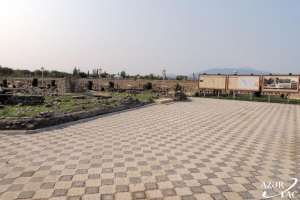


By escalating the situation on the line of contact on the eve of the OSCE Minsk Group co-chairmen’s visit to Azerbaijan, Armenia pursues the goal of undermining the settlement of the Armenia-Azerbaijan Nagorno-Karabakh conflict via substantive negotiations and maintaining the status quo, Hikmat Hajiyev, spokesman for the Azerbaijani foreign ministry, told Trend June 17.
Hajiyev was commenting the escalation of the situation on the line of contact between Armenian and Azerbaijani troops.
He said that the chronicle of events on the line of contact has evidently demonstrated since June 15 that the instigator of ceasefire violations and perpetration of provocations is Armenia.
“According to the Azerbaijani defense ministry, the Armenian armed forces continue to violate ceasefire by using large-caliber weapons and commit provocations on the eve of OSCE Minsk Group co-chairmen’s visit to Azerbaijan,” he added. “Thus, consistent mythic propaganda of Armenia on alleged violation of ceasefire by other party completely shatters.”
“The OSCE Minsk Group’s co-chairmen must take into account that the escalation of the situation by Armenia followed their visit to the region, as well as to the occupied territories of Azerbaijan,” he said.
Hajiyev added that the main reason of ceasefire violation is the presence of Armenian armed forces in the occupied territories of Azerbaijan.
“The norms and principles of international law, the relevant resolutions of the UN Security Council, the statements of the OSCE Minsk Group’s co-chairmen and the current proposals on the negotiating table demand withdrawal of Armenia’s troops from the occupied lands of Azerbaijan,” he said.
“The Azerbaijani armed forces acting in the sovereign territories of Azerbaijan amid Armenia’s aggression protect Azerbaijan’s territories and civilians especially those living along the line of contact,” he added.
Hajiyev said that the responsibility for escalation of the situation entirely falls on Armenia.
The conflict between the two South Caucasus countries began in 1988 when Armenia made territorial claims against Azerbaijan. As a result of the ensuing war, in 1992 Armenian armed forces occupied 20 percent of Azerbaijan, including the Nagorno-Karabakh region and seven surrounding districts.
The 1994 ceasefire agreement was followed by peace negotiations. Armenia has not yet implemented four UN Security Council resolutions on withdrawal of its armed forces from the Nagorno-Karabakh and the surrounding districts.














